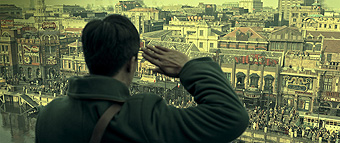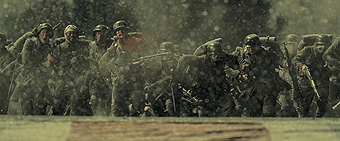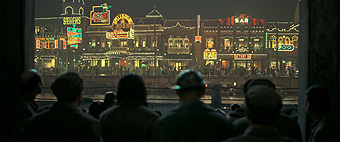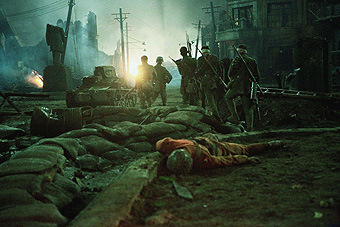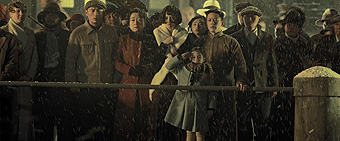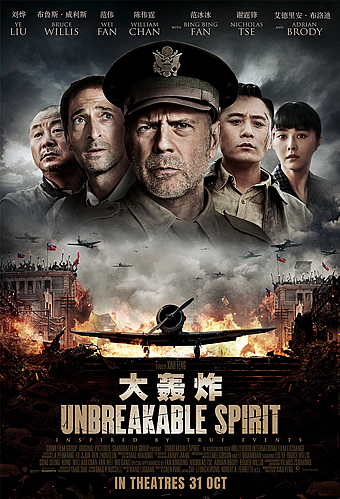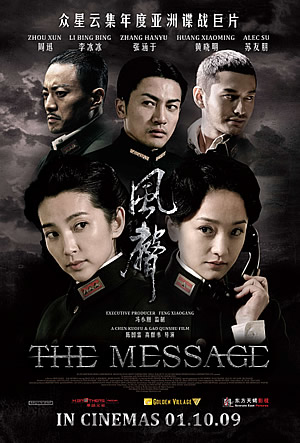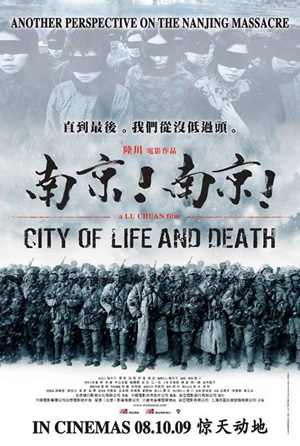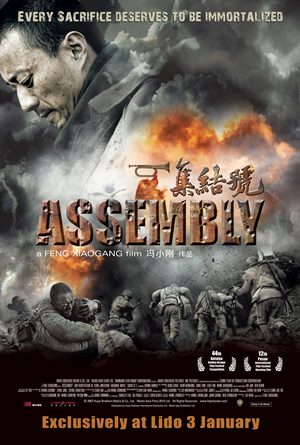THE EIGHT HUNDRED (八佰) (2020)
Genre: War/Drama
Director: Guan Hu
Cast: Jiang Wu, Li Chen, Zheng Kai, Du Chun, Vision Wei, Wang Qianyuan, Zhang Yi, Oho Ou, Hou Yong
Runtime: 2 hrs 29 mins
Rating: NC16 (Violence)
Released By: Shaw Organisation
Official Website:
Opening Day: 10 September 2020
Synopsis: The film is based on true events taking place during Sino-Japanese war in Shanghai, China in 1937. There are around 400 soldiers (so called Eight Hundred Heroes in history), holding out against numerous waves of Japanese forces for 4 days and 4 nights during the battle and protection of the Si Hang Warehouse.
Movie Review:
They were just over 400, not 800 as they had let others believe; and over four days in late 1937, these men made up of veteran soldiers of the 542th Regiment from the elite 88th Division of the Chinese Resistance Army (NRA), as well as civilians and deserters of less-trained security corps of Hubei, Hunan and Zhejiang, were holed up in the Sihang Warehouse against the Japanese Third Division, the highest calibre of the Imperial Army.
As a Mainland China production, ‘The Eight Hundred’ cannot not be a patriotic war movie; but amidst the overt demonstrations of courage and devotion to country, writer-director Guan Hu paints a surprisingly nuanced portrait of cowardice and self-preservation. Next to the stoic commander Col Xie Junyuan (Du Chun), there is the cowardly Lao Tie (Jiang Wu), who wants only to get back to his village and continue being a farmer; and then there is the circumspect Duan Wu (Ou Hao), who struggles to reconcile the grimness of their situation vis-à-vis the seemingly obliviousness of those living in the foreign concessions just a mere river away.
Indeed, the juxtaposition is wholly intentional. Though Hu stuffs too many supporting parts into the narrative, those that stand out are the ones who ultimately are forced to make their moral choices amidst the heat of battle. Stay or fight with the rest? Flee or alert the rest of the men of an impending ambush? Obey orders or do what is noble and honourable? The last, in particular, takes aim at the KMT for obvious (political) reasons, illustrating how their leadership had ultimately for the sake of expediency betrayed the country into the hands of the Japanese.
We’re not quite sure what tweaks were made to the storytelling in order to satisfy the Chinese censors to agree to lift the unofficial ban on the movie a year ago, which scuttled its high-profile debut at the Shanghai International Film Festival as well as its summer release then. Notwithstanding, this mega production that costs an unprecedented $80 million still looks and feels every bit like the blockbuster it was meant to be, unfolding tersely and tensely the fateful events of the four days the men held up in the warehouse against the Japanese onslaught.
Each day is a set-piece in itself. The first sees the Japanese try to overcome with sheer numbers and firepower, though failing to overtake the warehouse after having been met with a fiercer resistance than expected. The second finds them try with strategic formation, vowing to overpower in three days with tanks, mortars and other artillery. The third has the men attempting to keep the national flag raised on the rooftop of the building, all the while enduring an aerial assault from a Japanese fighter plane. And last but not least, the fourth sees them try to cross the New Lese Bridge to the concessions, after being abandoned by the Generalissimo.
Working with cinematographer Cao Yu, visual effects supervisors Tim Crosbie and Jason Troughton, and veteran action coordinator Glenn Boswell, Hu choreographs and executes four days of blood-soaked intense action, no less thrilling than that of recent Hollywood war movies such as ‘1917’ and ‘Dunkirk’; in fact, we would even go as far to say that the carnage here is sometimes more vivid than its Western counterparts. There is also significant attention paid to the details, from the faithful recreations of 1930s Shanghai to the rubble of the Sihang warehouse and right down to the very military hardware and formations. This is the first Chinese movie to be shot entirely on IMAX, and that achievement is right up there on the big screen.
Though somewhat thin on characterisation, there is still emotional resonance to be found within the visual spectacle. Hu intersperses the action with quieter moments of intimacy – for example, the camaraderie which develops between Lao Tie and Yang Guai (Wang Qianyuan) – and symbolic scenes of say the men standing in rows waiting for their turn to take their last bath. Hu is sometimes guilty of clichés, especially that of a runway white horse whose fur is tainted by blood as the days go by, but there is nonetheless impressive artistic vision from a director whose earlier projects (such as the crime drama ‘Mr Six’) had not portended such dramatic accomplishment.
So politics aside, ‘The Eight Hundred’ is no doubt a stunning blockbuster war epic, replete with riveting battle action, impeccable historical detail and enough nuance to rescue it from being mere propaganda. It stands at a hefty two and a half hours, but given how fast the fights unfold, you won’t feel the runtime. Though the ending is well known, we should warn those looking for a satisfying finish that there is none to be found here, not due to the fault of the filmmaker but rather what had met the 400 over men at the end of their ordeal. Yes, despite being only half their titular number, their heroism shows the strength, power and endurance of an indomitable fighting spirit, which deserves to be celebrated any day but even more in these bleak times.
Movie Rating:




(Every bit the blockbuster war epic it has been touted to be, 'The Eight Hundred' boasts riveting battle action, impeccable historical detail and enough nuance from being mere propaganda)
Review by Gabriel Chong
You might also like:
.jpg)
Movie Stills
